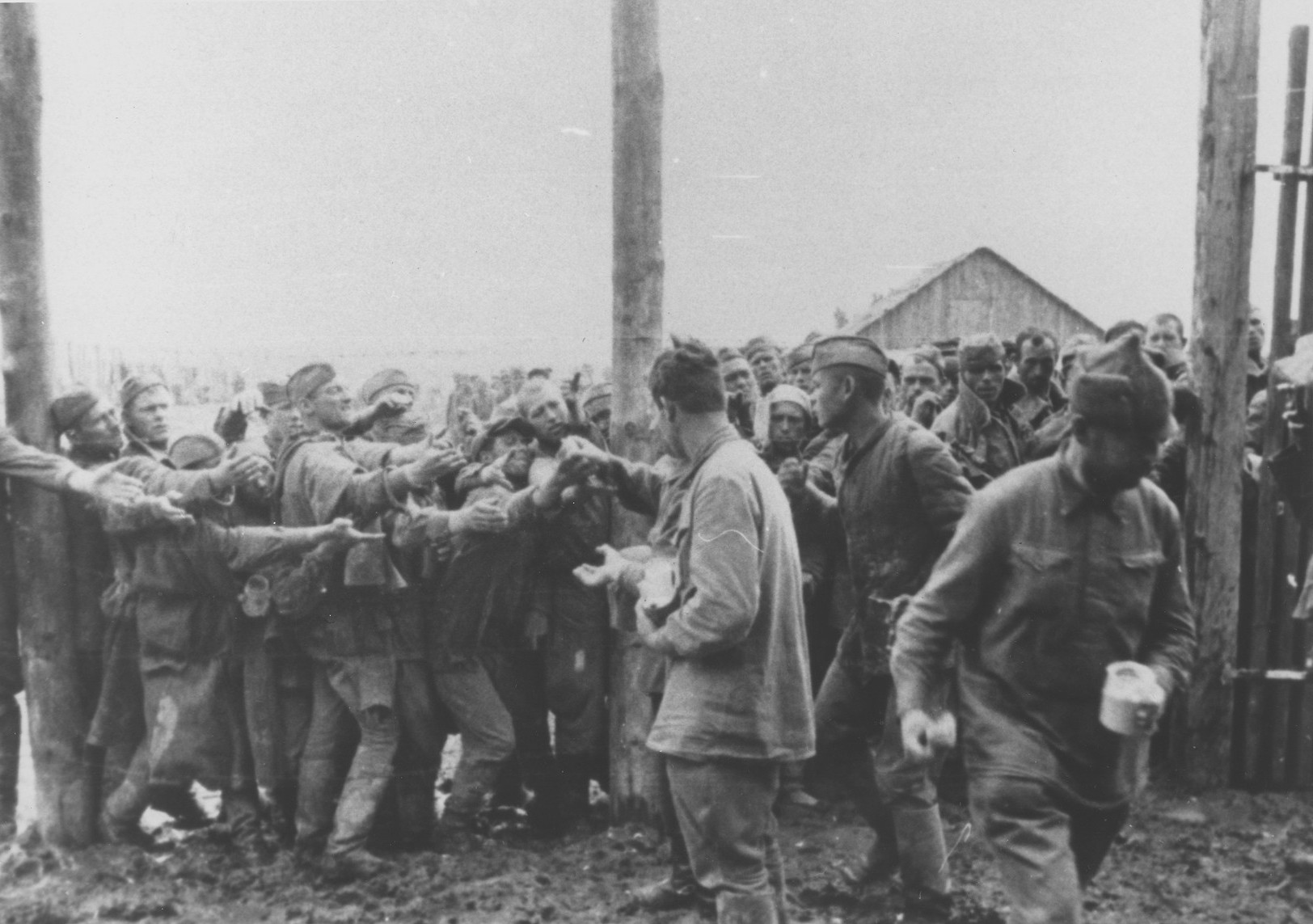
German atrocities committed against Soviet prisoners of war
During World War II, Soviet prisoners of war (POWs) held by Nazi Germany and primarily in the custody of the German Army, were starved and subjected to deadly conditions. Of nearly six million that were captured, around three million died during their imprisonment.
German atrocities against Soviet prisoners of war
In June 1941, Germany and its allies invaded the Soviet Union and carried out a war of extermination with complete disregard for the laws and customs of war. Among the criminal orders issued before the invasion was the execution of captured Soviet commissars. Although Germany largely upheld its obligations under the Geneva Convention with prisoners of war of other nationalities, military planners decided to breach it with the Soviet prisoners. By the end of 1941, millions of Soviet soldiers had been captured, mostly in large-scale encirclement operations during the German Army's rapid advance. Two-thirds of them died from starvation, exposure, and disease by early 1942—ranking as one of the highest death rates from mass atrocity in history.
Soviet Jews, political commissars, and sometimes officers, communists, intellectuals, Asians, and female combatants were systematically targeted for execution. A larger number of prisoners were shot for being wounded, ill, or unable to keep up with forced marches. Over a million were deported to Germany for forced labor, where they died in large numbers in sight of the local population. Their conditions were worse than civilian forced laborers or prisoners of war from other countries. More than 100,000 were transferred to Nazi concentration camps, where they were treated worse than other prisoners. An estimated 1.4 million Soviet prisoners of war served as auxiliaries to the German military or SS. Collaborators were essential to the German war effort as well as to the Holocaust in Eastern Europe.
The deaths among Soviet prisoners of war were numerically exceeded only by the (civilian) Jews and has been called "one of the greatest crimes in military history".[3] Nevertheless, their fate is much less well studied. Although the Soviet Union announced the death penalty for surrender early in the war, most former prisoners were reintegrated into Soviet society. The majority of defectors and collaborators escaped prosecution. Former prisoners of war were not recognized as veterans and did not receive any reparations until 2015; they often faced discrimination due to the perception that they were traitors or deserters.
Planning and legal basis[edit]
Prior to World War II, the treatment of prisoners of war had occupied a central role in the codification of the law of war, and detailed guidelines were laid down in the 1907 Hague Convention.[24] Germany was also a signatory to the 1929 Geneva Convention on Prisoners of War and generally adhered to it when it came to other nationalities of prisoners of war.[25][26] These laws were covered in the Wehrmacht's military education and there were no legal gray areas that could be exploited to justify its actions.[24] Unlike Germany, the Soviet Union was not a signatory of either convention; its offer to abide by the Hague Convention's provisions regarding prisoners of war if the German army did likewise was rejected by German dictator Adolf Hitler several weeks after the start of the war.[27] The OKW ordered that the Geneva Convention did not apply to the Soviet prisoners of war, but nevertheless suggested that it be used as the basis of planning. Law and morality played at most a minor role in this planning, in contrast to the demand for labor and military expediency.[28] On 30 March 1941, Hitler stated privately that "we must distance ourselves from the standpoint of soldierly comradeship" and fight a "war of extermination" because Red Army soldiers were "no comrade" of Germans. No one present raised any objection.[29][30] Although the mass deaths of prisoners in 1941 were controversial within the Wehrmacht, Helmuth James Graf von Moltke was one of the few high-ranking officials who favored treating Soviet prisoners according to the law.[31]
Anti-Bolshevism, antisemitism, and racism are often cited as the main reasons behind the mass death of the prisoners, as well as the regime's conflicting demands for security, food, and labor.[32][33] It is disputed if the German command planned to use the Soviet prisoners of war as a labor reserve,[34][29] or if the forced labor program developed after the Wehrmacht's failure to secure a quick victory.[35][36] Little planning was done[37][35][38][39] for how to house and feed the millions of soldiers to be captured as part of the rapid encirclement actions that the German commanders expected to enable the blitzkrieg.[40] During the invasion of France in 1940, 1.9 million prisoners of war were housed and fed, which historian Alex J. Kay cites as evidence that supply and logistics cannot explain the mass death of Soviet prisoners of war.[41]